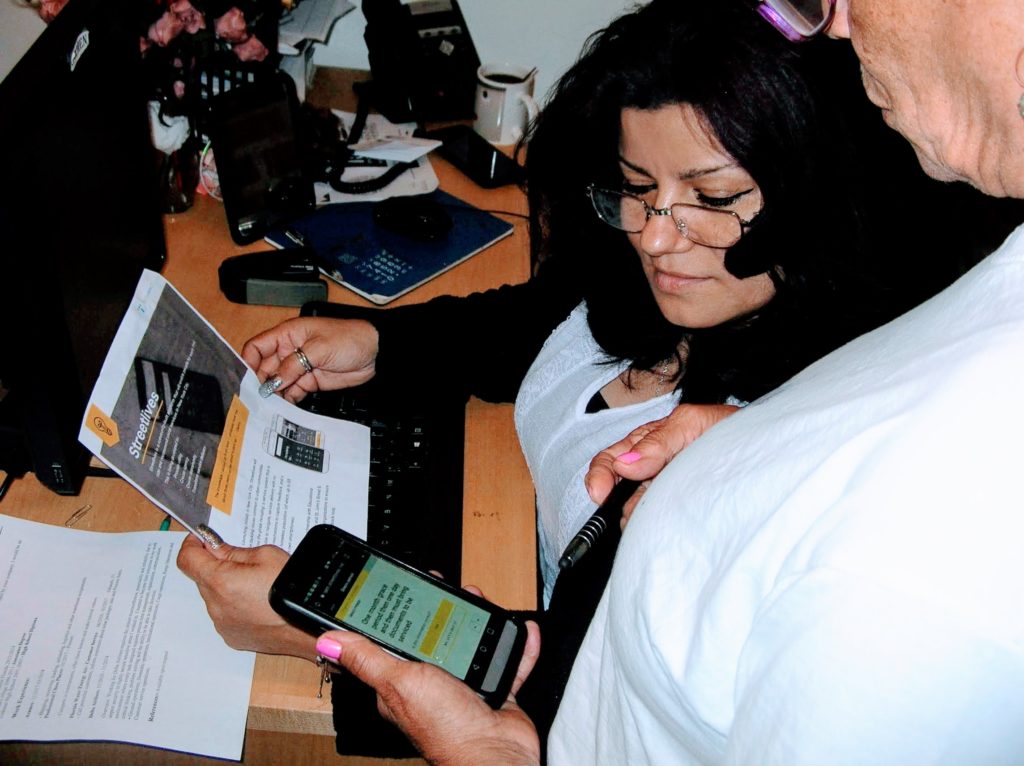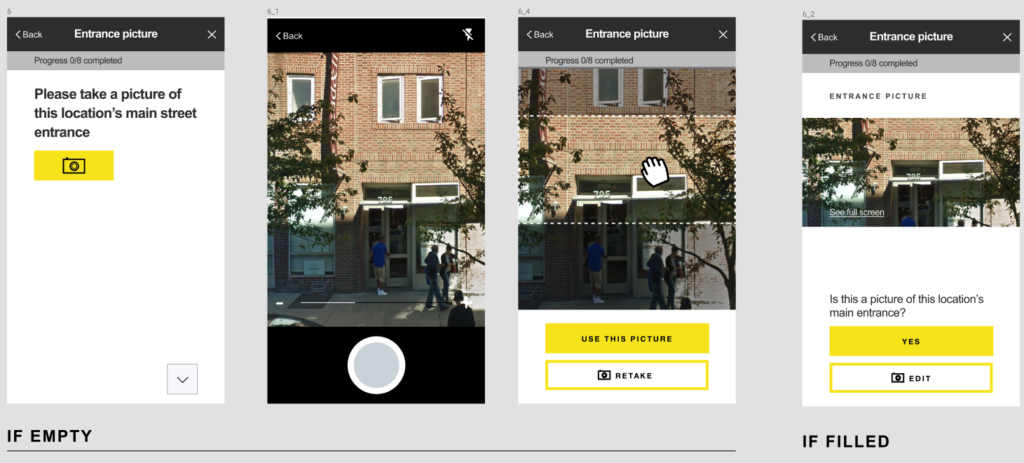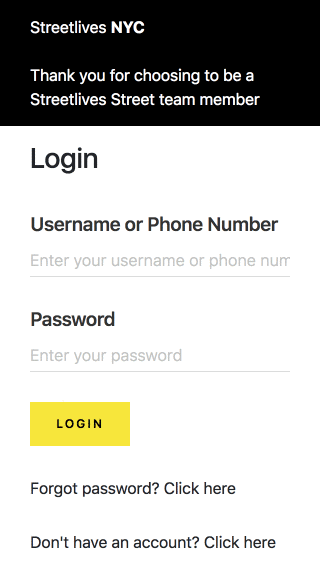[Our post today is from Adam Bard, founder of the Streetlives project. Welcome, Adam!]
What is Streetlives?
Streetlives is a community built platform that will enable people who are homeless or in poverty to easily find, rate and recommend social services in NYC. This all-inclusive feedback loop can help stakeholders to collaboratively improve programs and services.
Everything we do is guided by the needs of vulnerable people. We run ongoing research and co-design sessions with the community, service provider partners and members of the city administration to prototype and iterate on solutions to their problems.

The first piece of technology we have launched is the Streetlives Street Team Tool, which is a mobile-first platform for people to create, gather and validate information on social services in Open Referral’s Human Services Data Specification.
The Streetlives Street Team Tool
We have heard from many of our community that the multiplicity of inaccurate, out-of-date and incomplete information available online creates frustration and anger for those trying to access services. Vulnerable people are using precious time and money to travel to that service which looks just right – only to find that it has been canceled, the hours or eligibility have changed, or the organization has moved or closed.
Users of services do not trust information provided by ‘the system’ as much as information passed on by another service user. Though users of services are often among the first to know of changes to programs and services they have no established way of sharing that knowledge.
We intend to activate that population to share information, validated onsite in person. To that end, we have built a simple mobile-first tool which enables people to create and validate information about social services.
- The tool focuses on information that Streetlives users have found to be helpful in quickly choosing and accessing services
- The data gathered by the Street Team Tool will underpin service provider information shared on the public Streetlives platform
- This data will be also accessible as open data, in the Human Services Data Specification format, via API.
A full report on the build of the Street Team Tool is available here.
Why we chose Open Referral
Having undertaken an extensive human-centered design and research process with more than 50 people of lived experience of homelessness, we found that the information our community wanted to be able to find mapped well onto Open Referral’s HSDS data model.
The Open Referral model saves us time and makes us ‘smarter’
The HSDS model gave us a tried and trustworthy way to structure our data, as we ourselves were still learning about all the nuances and complexity of this domain. We were relieved to be able to adopt a standard that reflects a collected wisdom from the field, rather than rely entirely upon our own speculation about how we should model the data.
Further, it brings us closer into alignment with other potential data sources (some now, and we believe even more in the future), making it much easier to import data from other sources.
All of this makes things easier for our developers, and we hope will help us solve some problems before they even come up.
Open Referral’s principles align with our own
We believe strongly that digital tools better meet the needs of their users if they are built with, and ideally in, the community they are intended to benefit. If projects are not inclusive then the data those tools gather will likely mischaracterize the situation or population, or at worst, exacerbate discrimination and iniquity.
Put plainly, the end must also be the means. If we want a more equitable and inclusive society, then we must build equitably and inclusively.
Open Referral envisages a world where everyone has access to – and the ability to effectively use – information about the resources that are available in their community. Streetlives would like to see people of lived experience of homelessness contribute to that vision in a very tangible way.
Furthermore, using Open Referral to structure our data means the insights we gain from our community can have a wide impact on other projects and organizations as well. Streetlives gives a voice to people of lived experience, by directly involving them in the process of generating the data for and about them. Open Referral enables us to structure that data in such a way that it can be easily shared outside of the Streetlives platform, which means that our users’ voice won’t be limited to whatever specific applications we come up with. Rather, it can be heard and picked up by anyone, and thus spread throughout the public services space.
Our insights can also shape Open Referral and the broader field
Our primary user perspective is that of a person searching for information, rather than the more typical perspective of a third-party provider organizing and navigating data. Therefore, our focus is on making the data easy to discover for service users, i.e. categorized, tagged, and searchable.
In that sense, Streetlives is not focusing on ‘just the facts’; we are designing in accordance with our community’s desire to find services that ‘feel right’ for them. This is a messier and more subjective position.
Even something as seemingly simple as the naming/classification of services will be different for different individuals, not adhering to formalized terminology or definitions. For example, people might name, describe or search for a service by different terms than the provider or even each other, and our design needs to be flexible enough to reflect that.
Nevertheless, even when it comes to ‘just the facts,’ we have found some gaps between what HSDS articulates and what our users need – some data they would need which either wasn’t represented at all, or not represented in the schema with the nuance needed.
For example, one of our user group’s most highly prioritized pieces of information is pictures of the street entrances to services – which doesn’t currently exist in the specification.

We’ve also found a need for eligibility criteria to be much more fully articulated.
In any case, our intention is to extend and build on the standard, and feed that information back to the Open Referral community. We believe that insights like these, solicited through sustained dialogue with our users and ecosystem stakeholders, can greatly enrich the data and standards. Furthermore, with demonstrable success, we believe that our user community will also emerge to stand among the strongest advocates for an open and robust service information infrastructure.
Our work is just beginning
In the future we’d love to publish (and receive) OR compliant datasets, which fulfill aims around collaboration and allow us to learn from each other. Whereas currently each initiative in this space is often siloed, gathering its own data and rediscovering much on its own, we believe the ready availability of this data can significantly lower the barrier to entry for further initiatives in this space, bringing about much-needed innovation in the sector of digital services for people in need.
Help us move this project forward
Streetlives are actively seeking funds to continue our collaborative work with people of lived experience of homelessness. We are looking to hire 3 people from the community on a part-time basis, budgeting $30K for a 4 month pilot of our Street Team Tool to be run out of our provider partner locations at Bed-Stuy, Lower East Side, and Harlem in New York City. Contributions to Streetlives can be made through PayPal.
For large tax-deductible donations, other support at scale, and for any like-minded technologists interested in bringing meaningful change to the lives of vulnerable people, please reach out to us at [email protected]



Leave a Reply